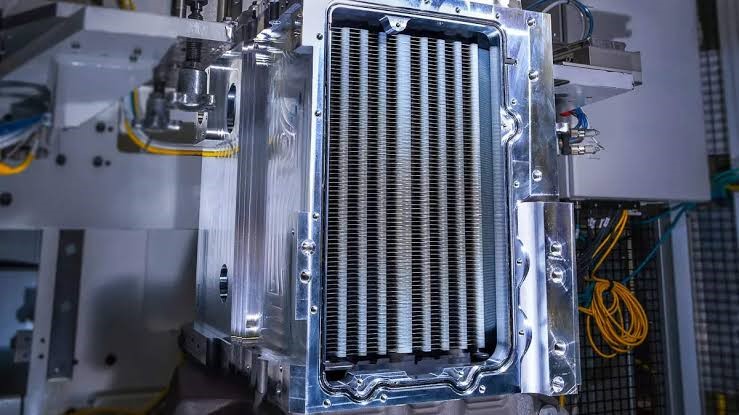
Fuel Cell

08.01.2024
Fuel Cell , Daily Current Affairs , RACE IAS : Best IAS Coaching in Lucknow
|
For Prelims:What is a Fuel Cell?,How does a Fuel Cell Work?,Benefits of Fuel Cells |
Why in the news?
The Indian Space Research Organisation (ISRO) successfully demonstrated a fuel cell that uses hydrogen and oxygen to generate electricity and releases heat and water as byproducts.
What is a Fuel Cell?
- A fuel cell is a device that makes electricity from fuel and air.
- Instead of burning the fuel to make heat to drive a mechanical generator, fuel cells react the fuel and air electrochemically, without combustion.
- The electrochemical approach avoids pollutants that are created by high flame temperatures, and it is a more direct and efficient way to make power from a fuel.
- Fuel cells are configured in stacks of individual cells connected in a series.
How does a Fuel Cell Work?
- Fuel cells work like batteries, but they do not run down or need recharging.
- They produce electricity and heat as long as fuel is supplied.
- A fuel cell consists of two electrodes—a negative electrode (or anode) and a positive electrode (or cathode)—sandwiched around an electrolyte.
- A fuel, such as hydrogen, is fed to the anode, and air is fed to the cathode.
- In a hydrogen fuel cell, a catalyst at the anode separates hydrogen molecules into protons and electrons, which take different paths to the cathode.
- The electrons go through an external circuit, creating a flow of electricity.
- The protons migrate through the electrolyte to the cathode, where they unite with oxygen and the electrons to produce water and heat.
Benefits of Fuel Cells:
- Clean Energy: Fuel cells generate electricity through a chemical reaction, producing only water and heat as by-products. This makes them a cleaner alternative to traditional fossil fuels and helps reduce greenhouse gas emissions.
- High Efficiency: Fuel cells are highly efficient, with some fuel cell systems achieving efficiencies of up to 60%. This means that more energy is converted into usable electricity, reducing the amount of waste generated during the process.
- Versatility: Fuel cells can be used in a variety of applications, from transportation to stationary power systems. This versatility makes them a promising option for India, which is facing a growing energy demand.
- Reliability: Fuel cells are highly reliable and can provide a continuous source of energy, making them well-suited for use in critical applications such as hospitals and disaster relief efforts.
Source: Business standard